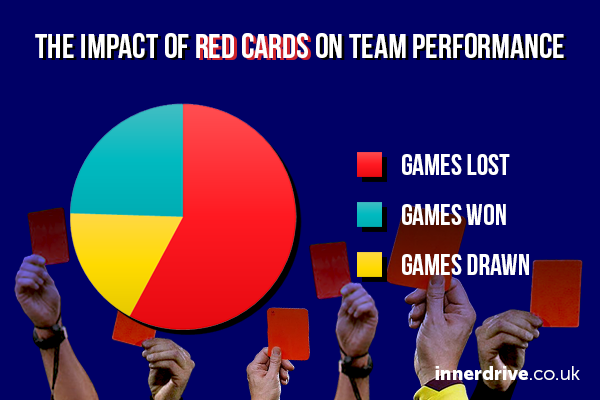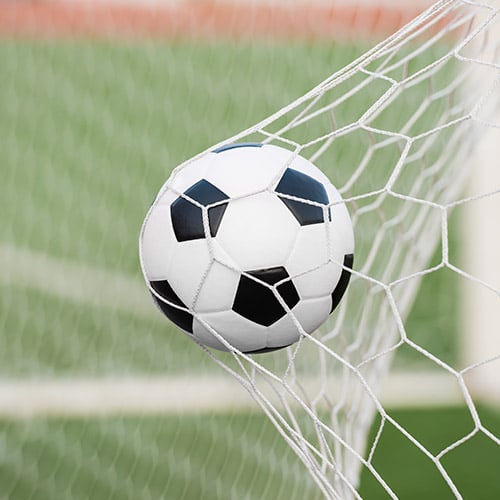With the football season back up and running and games coming thick and fast, we have already seen a number of red cards, not to mention the two red cards in Chelsea’s champions league game and the red card in Man City’s game last week alone. Last year saw a whopping 47 red cards in the Premier League alone.
For most football fans, there is no doubt that having an extra player on the pitch gives you an obvious advantage. But at InnerDrive HQ, we wanted to find out just how costly red cards can be on top of that.
The Impact of Red Cards
We looked at every fixture in the 18/19 Premier League season where a red card was issued and compared how many of those games were won, drawn or lost by the penalised team – and, crucially, when during the game the red card was shown.

It will come as no surprise that teams who lost a player because of a red card lost on average 59% of the time. Only 23% of games were won and 18% of games were drawn when that team received a red card. Interestingly, the average time a red card was issued during a game was at 59 minutes – which is fairly late on.
Knowing that teams who receive a red card lose significantly more matches than teams that don’t, we thought we’d investigate what players should do to minimise the risk of a red card and what players should do if their team gets a red card.
How can players lower the risk of red cards?
Stay in the moment
When players lose their focus, bad things can happen. If you think about it, it’s not a coincidence that the average time a red card was issued was in the 59th minute. It could be that footballers were starting to become mentally fatigued, meaning that they were not focused on the right thing at the right time anymore. That can lead to making costly mistakes and poor challenges.
In a sport like football, it’s hard to regulate your concentration as you have to be ‘always on’. People often think that to stay concentrated they need to constantly think about what is going on to make sure that they don’t zone out. However, this can cause a player to burn out.
So, how do you stay concentrated for longer and with more purpose? What we usually advise footballers to do is, before you play, ask yourself: what three things do I need to do to play at my best? By thinking of these specific things throughout the game, you will do everything you need to do but also ensure you are not overthinking.
Fail to prepare, prepare to fail
Prior planning and preparation, both physically and mentally, are key to success in sports. Knowing your role within your team is vital in football. Interestingly, when athletes don’t understand their role, they may experience an increase in anxiety and have a hard time believing in their ability. But why is this so important? Well, when players are nervous and don’t ‘back themselves’, they can stop committing to challenges – which can often lead to mistakes and thus red cards.
As well as physically, players can also prepare mentally. Players that prepare better mentally often see themselves playing better, remember their best performances and, believe it or not, are more likely to replicate this and be more confident! To find out how to prepare mentally before a match, check out our guide here.
Weather the storm
A really easy way to stop players from making rash decisions is to teach them that things don’t always go their way and that this is okay. In a blog we wrote recently, we found out that the favourite team only wins the game 57.9% of the time. This means that being the favourite does not guarantee you success – but equally, it means that there’s always a chance that things can go your way if you’re the underdog.
In our experience, when our players accept that things might not always go their way, it stops them from ‘chasing the game’ and it can, as a consequence, stop them from making rash decisions too. When we stop players from working too hard and putting unnecessary pressure on themselves, making poor decisions as a result, we often see them become more successful and penalised less.
What should players do when their team is red carded?
In sport, emotions can both help and hinder us. There is no doubt that, when a player gets red carded, their teammates will have an emotional reaction, even if it is different from player to player. So, when this happens, what should you do?
Keep calm and carry on
Interesting research has shown that emotions impact athletes’ motivation as well as their physical and mental performance. This means that it is vital that players can get their emotions in check quickly and carry on with the game.
One great way that players can do this is by thinking about what they are focusing on. Players often get emotional because they think too much about the red card or what it means for the team – neither of which they can control. As they can’t directly change these, they lose their sense of certainty and control which causes stress. So, if players can instead start to think about what they can directly control to help influence the outcome of the game, they quickly become less emotional and start to play how they need to. Controlling emotions can be difficult so be sure to check our guide to emotional control in sports.
Stay in the ‘sweet spot’
Psychologists have long speculated that there is a sweet spot in terms of performance and motivation. Too little and athletes don’t care enough to perform well. Too much and they find it hard to execute their skills.
A great reaction to a teammate being red carded is to use it as motivation and fuel to play well. However, this can be a double-edged sword. If players become overly motivated, they can end up to forcing the play and making the team’s situation worse. Interestingly, research has shown that this can cause players to choke, which is the last thing a team needs when they have lost one of their players. Therefore, players should use it as fuel but make sure they stay in control to play their best.
Final Thought
When losing a teammate to a red card, the automatic psychological response as an athlete is to let your head go down. But with the use of psychological skills, athletes can learn to control their emotions in situations which would otherwise be detrimental to their performance, and keep their focus on the game to reduce the risk of receiving a red card and to play their best if they get one.





